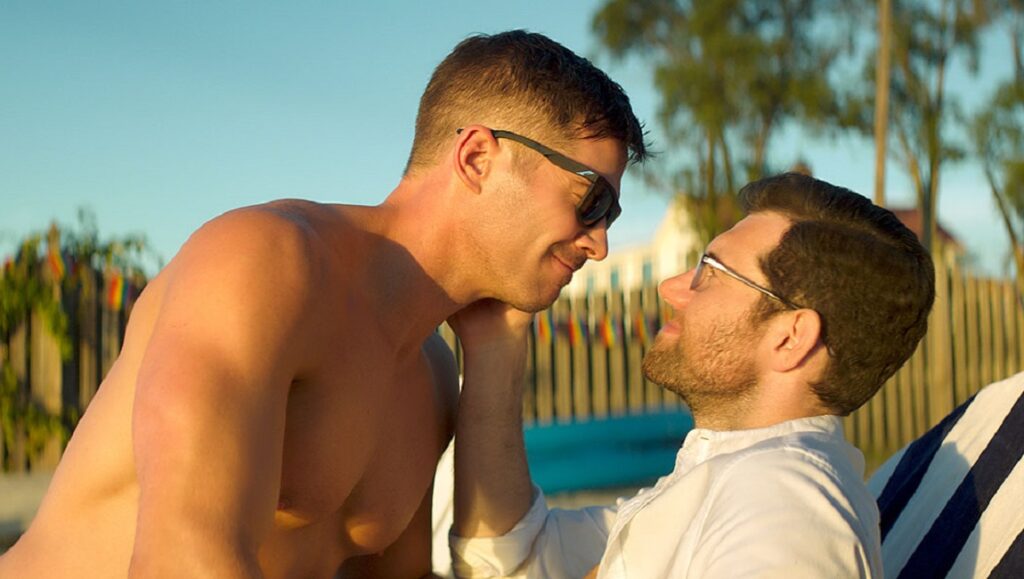Bros is a would be rom-com lacking in comedy, chemistry, and untroubled rhetoric on gay culture.
First off, the good news: director/co-writer Nicholas Stoller’s Bros is a gay romantic comedy that avoids anything resembling the familiar narrative arcs of tragedy or the pitfalls of coming out, and features a cast entirely made up of LGBTQIA+ performers. The bad news: everything else. It would be easy to grade the film on a curve, applauding both its good intentions and queer representation, which is very sorely lacking in Hollywood’s mainstream films. But it almost feels as if Stoller and co-writer/star Billy Eichner were banking on such goodwill, to the point that the entire endeavor feels like a cop-out, an opportunity to do something bold but hedging their bets in the face of losing those all-important hetero ticket sales. That the film even addresses this issue in the most meta way possible points to the smugness of the project, a self-congratulatory tone strangling the laughs it so desperately attempts to conjure.
Eichner stars as Bobby Lieber, a 40-year-old author and successful podcaster who is also head chair of the world’s first LBGTQIA+ history museum, set to open in New York City in a matter of months. A self-described “gay neurotic Jew,” he has become accustomed to a life of romantic solitude, never once having been in a serious relationship and spending his free time cruising various hook-up apps. It’s while in attendance at a random circuit party that he meets Aaron (Luke Macfarlane), an estate attorney and all-around beefcake who never met an attractive gay couple he didn’t want to screw. The two seem like polar opposites, with Bobby taking on the role of confrontational intellectual and Aaron being the goofy, sports-loving frat boy. Neither are looking for a relationship, nor necessarily even want one, resulting in a tumultuous romance that Bros follows for two never-ending hours. Stoller’s film is beset by many problems, the biggest being that its two protagonists are selfish, unlikable assholes, and spending time in their company is wholly unenjoyable. This immediately leads into the second issue, which is that Eichner and Macfarlane share little in the way of chemistry, leaving a black hole where the film’s heart necessarily should exist. It doesn’t help that Macfarlane is atrocious in his first big-screen leading role, possessing nary an ounce of presence or comedic timing, though he’s admittedly given little to work with in that latter department. Stoller and Eichner traffic in a lot of jokes and comedic scenarios that might seem novel to its straight viewers, but which every gay man has seen or heard a thousand times before, including the inevitable Debra Messing cameo. In fact, the movie most resembles one of those terrible Friedberg/Seltzer parodies from the early 2000’s, Date Movie, Meet the Spartans, etc., in which mere recognition replaced actual jokes. Yeah, conversations on Grindr are intellectually insulting, and the random hook-ups that result from them are awkward. Is presenting such material, minus a punchline, supposed to satiate its intended audience?
There’s also the matter of Stoller and Eichner trying to cram far too much into the film, seemingly aspiring to touch on every single topic relevant to the LBGTQIA+ community — gay history included — but shortchanging them to the point of insult. The film’s portrait of self-esteem in relation to body image is especially perplexing, with Bobby at one point discovering that Aaron takes testosterone injections to maintain his killer bod and Aaron rightfully calling him out for his shocked and disdainful reaction, asserting that the body Bobby loves to ogle — and one that is often expected in gay culture — is impossible to attain otherwise. This is never brought up again, save for an extended gag where Bobby briefly experiments with steroids and puts on a deep voice, because why not make a joke of an issue that can be so serious to gay men? Meanwhile, Bobby has his own body issues, which the film only brings up whenever its two lovebirds are about to break up, with Bobby claiming that he isn’t built like the guys Aaron usually dates. The thing is, Eichner has publicly discussed how he got in shape for the film, and the man looks as though he is cut from stone. Had the movie been addressing the topic of body dysmorphia, this detail might actually make sense. But the film seems to firmly believe that Bobby’s body is something which would understandably bring shame to an individual, which is an absolutely loathsome element to include in a story catering to gay audiences. Then again, this is a movie that can’t stop repeating the phrase, “Gay men are stupid,” an irony the Bible Belt is sure to pick up on…
Still, there are moments where you catch glimpses of the film Bros could’ve been, the passion project this undoubtedly was for Eichner, including a killer monologue in which the actor discusses how ostentatious self-confidence is often used by gay men in an effort to both hide crippling doubt and silence those individuals who told them they were never good enough, that their stories didn’t matter. But there’s the rub: Bros ultimately doesn’t matter, a film that wants to be applauded for representation and merely existing when it can’t even be bothered to deliver an entertaining story. That Stoller and Eichner keep apologizing for telling their tale from the perspective of a cis-white male is symptomatic of the film’s problems as a whole; it reflects a tacit contradiction to the message that no one should ever feel ashamed of who they are or the story they possess, regardless of what the world tells them. Bros simply turns such moralizing into a self-aware joke, the kind where sincerity is both endlessly mocked and presented as a virtue. In trying to appeal to everyone, the film seems tailor-made for exactly no one. Save the hypocrisy for the streets, Billy.


Comments are closed.